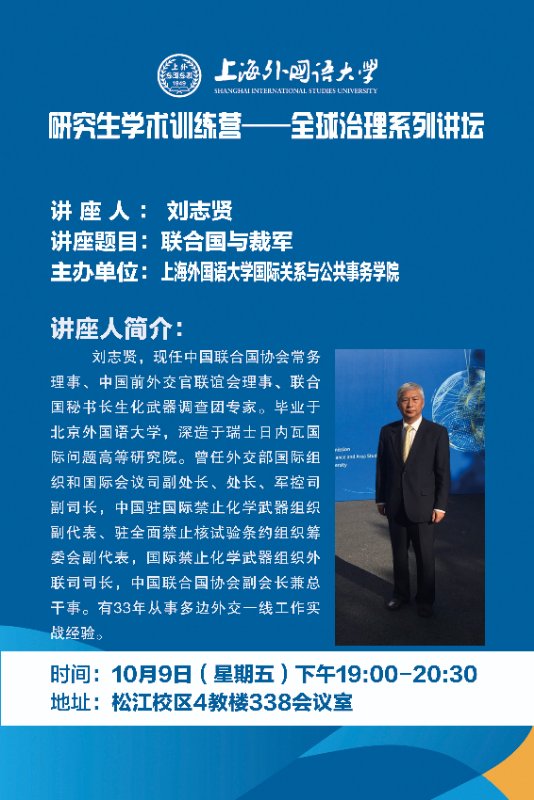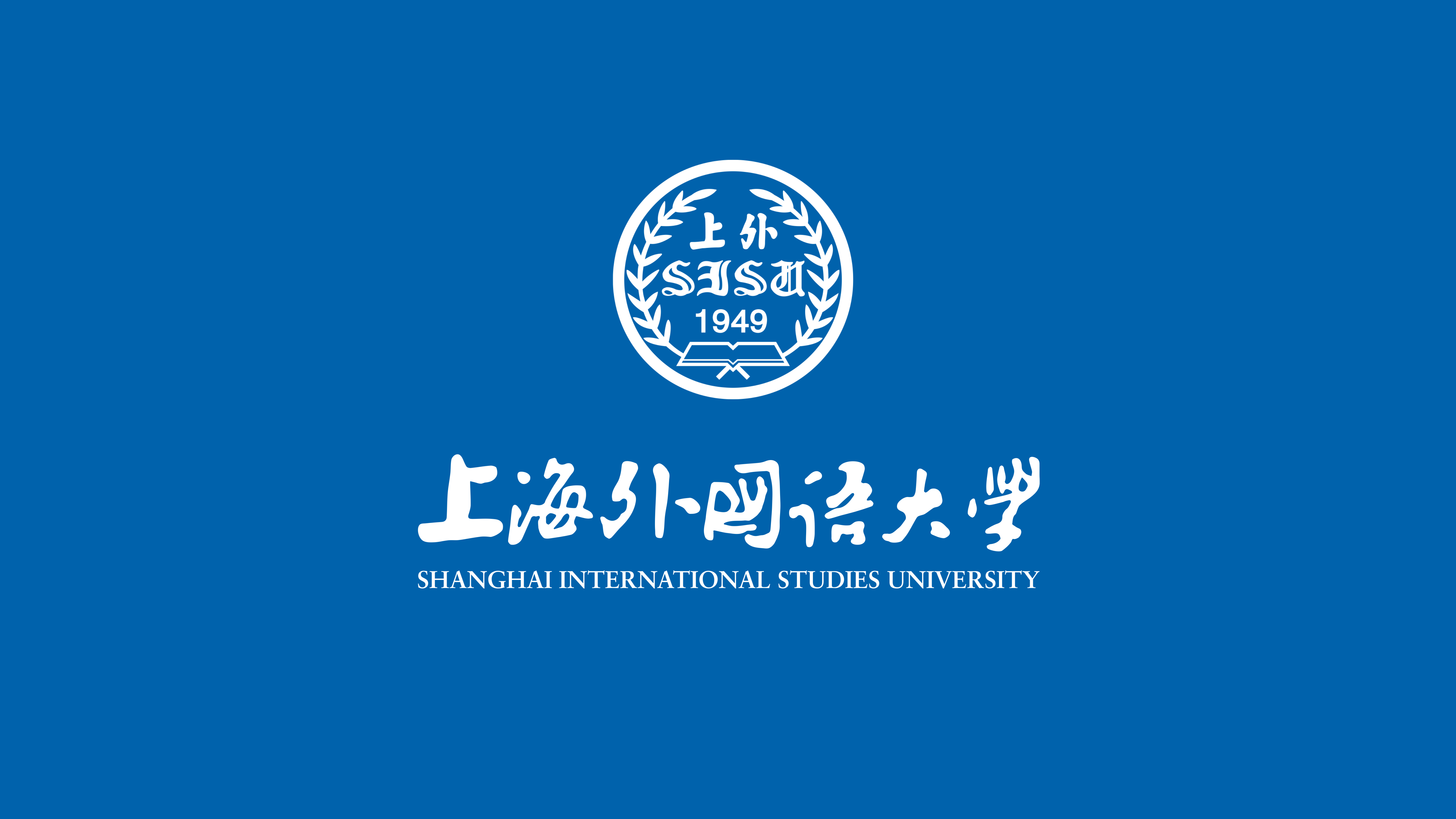新闻报道
联合国与裁军
当代青年学子和国际关系专业—在历史长河中寻找正确定位

新闻报道
金融科技与财务管理前沿理论与方法——资产定价模型的发展及论文选题建议

本次讲座将结合主讲人的研究经历,介绍资产定价领域结构模型近些年的发展,并就论文选题和投稿提供建议。
主持人:张健 教授
新闻报道
上外民乐团和舞蹈团联合工作坊:重 奏
本场工作坊由民乐团和舞蹈团联合举办,邀你共享佳音,随心而舞,组建一支肢体乐队。多元而和谐的乐曲,等你用身体重奏。
新闻报道
上外民乐团之"寻音·探乐"
节目预告:
1. 团员表演(20:00~20:40)
(1)琵琶《彝族舞曲》
(演奏:罗颖航、费凡)
(2)爵士鼓《小庐的初恋》
(演奏:凌云波)
(3)竹笛《姑苏行》
(演奏:姚思辰)
(4)鼓乐《辉煌》
(演奏:凌云波、胡彦)
(5)二胡《第一二胡狂想曲》
(演奏:张睿琪)
(6)现代民乐合奏《大鱼》
(演奏:程俊淏、凌云波、乌日丽嘎、杨子璇、张睿琪)
2. 体验式合奏(20:40~21:00)
新闻报道
民族室内乐的发展历程和演奏方法
18:30-19:30
特邀嘉宾讲解民族室内乐发展历程及民族室内乐演奏的问题与经验。
19:30-20:00
提问交流环节。
*为了保证大师课的顺利进行,请各位观众提前半小时入场。讲座过程中,请勿喧哗、随意走动,请勿录像。
新闻报道
语言与人类学:英国及世界的阶层、方言和民族认同

Topic: Language and Anthropology: Class, Dialect, and National Identity in the UK and Around the World
Abstract: Overview of the class; the difficulty of studying one’s own culture and what to do about it; language and ethnography; the European background; ethnicity, class, and food names; how English became the dominant language of England and then of the United Kingdom and of the British Empire; regional and class dialects; “Received Pronunciation” and its impact; radio and television; the marginalization of the Celtic languages and their current revival; globalization and contemporary English; the emergence of postcolonial versions of English; class, syntax, and the shifting grounds of vernacular usage.
获取更多与本讲座相关的详细信息,敬请关注中国外语战略研究中心公众号“语言与未来”(ID: sisuiol)的微信推送。
新闻报道
数字经济的机遇与挑战

本讲座将介绍以5G、人工智能、区块链和信息物理系统为核心的新型技术,和以平台为主要组织结构的经济形态,如何对经济社会发展产生的全方面重大影响,以及深入剖析在企业数字化转型的过程中存在的各种机遇和挑战。
新闻报道
翻译属于人工智能时代的濒危行业吗?

品牌:研究生学术训练营
系列主题:口笔译跨学科研究 (德语第2讲)
题目:翻译属于人工智能时代的濒危行业吗?
主讲人:黄霄翎(德国驻上海总领事馆资深翻译,上海翻译家协会会员)
主持人:孙瑜(高级翻译学院 德语口译专业教师)
时间:2020年10月24日 上午09:00-10:30
地点:腾讯会议 (会议 ID:985 206 355,密码:550906)
主办:上海外国语大学高级翻译学院
语言:汉语、德语
讲座内容简介:
人类社会进入人工智能时代,有哪些职业会消失呢?翻译职业会不会也逐渐被机器取代呢?从公元前六世纪古埃及文献中首次提到“翻译主管”时算起,翻译行业至少已经有两千多年历史了,这个古老的行业真的会消失吗?如果真会消失的话,又会以多快的速度消失呢?人类译员又如何应对这个趋势呢?能够采取什么措施吗?本讲座将基于丰富的事实、数据和案例,探讨在笔译、交传、同传领域,人类译员被人工智能替代的可能性和应对的措施。
报名方式:
本次工作坊拟定50名学员,本校在读研究生和青年学者优先录取,欢迎外校相关专业师生参与。报名方式为填写以下问卷,按照提交时间先后顺序确定。
链接:https://www.wjx.cn/jq/91273551.aspx
研究生学术训练营简介
为整合校内优秀学术资源、提升研究生学术研究和创新能力,上海外国语大学研究生院于2018年推出“上外研究生学术训练营”计划。第一批研究生学术训练营(2018-2019学年)于2019年6月结束,共举办了翻译研究等七个系列研究生学术训练营,分别由英语学院等七家单位主办。第二批研究生学术训练营(2019-2020学年)共有九个系列于2019年11月立项,主题涉及翻译研究、跨文化研究、口笔译跨学科研究、语言学研究、西语语言文化和拉美研究、信息素养、新闻传播学、金融科技与财务管理前沿理论与方法、质性研究与国际期刊论文发表等,分别由英语学院、跨文化研究中心、高级翻译学院、语言研究院、西方语系、图书馆、新闻传播学院、国际工商管理学院和国际教育学院主办。为继续推动研究生学术训练活动,经院系申请、研究生院审核,学校已于2020年9月批复了各院系申报的“2020年研究生学术训练营(2020年秋季)”。研究生学术训练营的活动形式为高端学术讲座、工作坊和学术沙龙等,主要对象为本校在读研究生、青年学者,欢迎兄弟高校师生参加! (http://graduate.shisu.edu.cn/8852/list.htm)
新闻报道
实战中的口译--口译员的职业素养、市场能力及创业精神

品牌:研究生学术训练营(德语第1讲)
系列主题:口笔译跨学科研究
题目: 实战中的口译——口译员的职业素养、市场能力及创业精神
主讲人:黄卫红(资深德、英口笔译,翻译公司创始人)
主持人:孙瑜(高级翻译学院 德语口译专业教师)
时间:2020年10月17日上午09:30-11:00
地点:腾讯会议 (会议 ID:274 307 610,密码:550906)
主办:上海外国语大学高级翻译学院
语言:汉语
讲座内容简介:
本讲座将聚焦口译实践,阐述市场实践中口译员应具有的职业能力和素养,包括如何胜任口译任务、赢得客户以及个人职业发展。具体而言,讲座内容涵盖以下内容: 如何赢得和维护口译客户;如何制作专业的报价单;口译员在会前、会中及会后与客户的沟通问题;经营自己的翻译公司经验谈。
报名方式:
本次工作坊拟定50名学员,本校在读研究生和青年学者优先录取,也欢迎外校相关专业师生参加。报名方式为填写以下问卷,按照提交时间先后顺序确定。
链接: https://www.wjx.cn/jq/91243115.aspx
研究生学术训练营简介
为整合校内优秀学术资源、提升研究生学术研究和创新能力,上海外国语大学研究生院于2018年推出“上外研究生学术训练营”计划。第一批研究生学术训练营(2018-2019学年)于2019年6月结束,共举办了翻译研究等七个系列研究生学术训练营,分别由英语学院等七家单位主办。第二批研究生学术训练营(2019-2020学年)共有九个系列于2019年11月立项,主题涉及翻译研究、跨文化研究、口笔译跨学科研究、语言学研究、西语语言文化和拉美研究、信息素养、新闻传播学、金融科技与财务管理前沿理论与方法、质性研究与国际期刊论文发表等,分别由英语学院、跨文化研究中心、高级翻译学院、语言研究院、西方语系、图书馆、新闻传播学院、国际工商管理学院和国际教育学院主办。为继续推动研究生学术训练活动,经院系申请、研究生院审核,学校已于2020年9月批复了各院系申报的“2020年研究生学术训练营(2020年秋季)”。研究生学术训练营的活动形式为高端学术讲座、工作坊和学术沙龙等,主要对象为本校在读研究生、青年学者,欢迎兄弟高校师生参加! (http://graduate.shisu.edu.cn/8852/list.htm)
新闻报道





